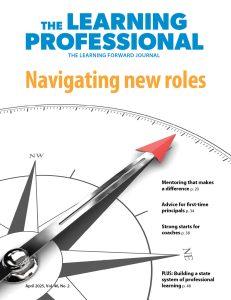Have you ever thought about writing a blog? Blogging can elevate your professional practice and expand your virtual Professional Learning Network.
Through blogs you can connect with colleagues and learn beyond boundaries. Blogging can also contribute to creating a culture where educators improve their practice. Blogs promote the concept of “collective efficacy” and demonstrate how learning improves when educators work together to make each other better. (Hattie, 2015. DeWitt, 2016)
Confession time. Before becoming a blogger, I was a “serial blog lurker.” Reading a variety of blogs inspired me to begin blogging. Blogs model strategies and techniques you can apply in your own writing.
Blogs are in real time, often improvisational, and use an economy of words to convey meaning in a succinct manner. A blog is a spontaneous expression of thought. Andrew Sullivan describes blogging this way. “Blogging is to writing what extreme sports are to athletics: more free-form, more accident-prone, less formal, more alive. It is, in many ways, writing out loud.”
Find Your Why
Finding your why is important to finding your blog voice. Your why is your purpose, cause or belief. (Sinek, 2013) This “why” guides your work. For me, understanding that my purpose is to “help educators do their important work better and learn better” guides my work. What is your “Why”?
So why do educators need professional learning networks, including blogs?
- Connect and collaborate with colleagues.
- Follow amazing educators and their blogs.
- Find and share ideas, lessons, resources, etc.
- Learn beyond boundaries. Flatten classroom walls.
- Develop your voice.
- Motivate learners.
- Clarify thinking.
- Be inspired and reflective.
- Explore new ideas.
- Find support.
- Express creativity.
- Discover the latest research and trends in education.
- Give away knowledge.
- Create a 24/7 learning environment.
Find your What
Have you ever wondered what you would write about in a blog? Educators spend their professional lives in experience-rich environments. These experiences are stories waiting to be told.
Blogs can tell the story of who you are; who your students are; describe your professional learning values; teach a lesson by sharing how a skill was mastered or change was implemented; motivate change by showing how you learned something through failure or success; establish the case for change; allow your audience to see a situation through a different lens or from a different perspective; create a vision of success; share what’s working with students; and celebrate colleagues and students.
Regardless of your role… teacher, coach, administrator, or student… your words have the power to offer perspective, insight, learning, understanding, encouragement and hope. When words become actionable, we can change our thinking and our practice to positively impact student learning. Blogs provide the opportunity for sharing your words beyond your borders.
A single person cannot carry the responsibility for professional development. Messages about effective learning should come from multiple informed voices. You can contribute to the collective professional development voice through blogging.
Find your How
Are you inspired to blog? Where and how do you start? Here are 12 tips for beginning bloggers.
- Take your readers on a journey.
- Make it real. Write about what you know and love.
- Be true to your voice. Write like you talk.
- Create content that is helpful and inspiring.
- Start an idea bank. Keep a journal.
- Cite appropriate research.
- Keep the blog brief. (1100 words max )
- Ask your readers questions.
- Respond to reader’s comments.
- Use your blog to promote positive change.
- Connect with the Learning Forward Standards.
- Write, write, write.
Blogs open the door to learning. You enter by reading and writing. As educators, ideas for blogging surround you. Channel this inspiration. Find your voice. Use your words to promote learning.
The best part about blogging is that you can bring out the magnificence in others. And isn’t that the most important role of an educator?
References
DeWitt, P. (2016). Collaborative leadership: 6 influences that matter most. Thousand Oaks, CA Corwin & Oxford, OH Learning Forward
Hattie, J. (2015). What works best in education: The politics of collaborative expertise. London, England: Pearson.
Sinek, S. (2013). Start with why.
Sullivan, A. (2008). Why I blog. The Atlantic.







